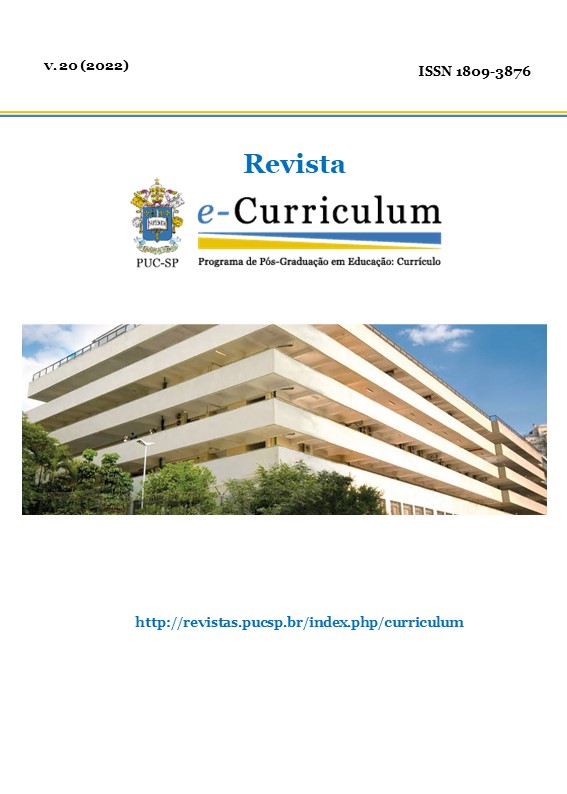Challenges of fragmented teaching
the reality of teachers working in areas for which they have no training
DOI:
https://doi.org/10.23925/1809-3876.2022v20i2p868-892Keywords:
teacher training, pedagogical practice, basic education, teaching, learningAbstract
This article is the result of a case study in the municipality of Canguçu/RS, whose education network has a high rate of teachers teaching subjects for which they do not have specific training. The objective was to investigate the pedagogical practice of teachers with and without training in the area in which they work, seeking to identify and understand their characteristics, highlight challenges and repercussions in teaching and in the teaching and learning process. The methodology includes bibliographic review, document analysis, observations and interviews with four teachers licensed in Arts, History (2) and Geography. The research showed that professionals without specific training have difficulties directly related to qualification in a different area, in addition to insecurity and discontent with this condition, considered as fragmentation of teaching.
References
BOGDAN, Robert; BIKLEN, Sari K. Investigação qualitativa em educação. Boston: Allyn and Bacon, 1994.
CALLAI, Helena Copetti. A formação do profissional da geografia: o professor. Ijuí: Editora Unijuí, 2013.
FREIRE, Paulo. Pedagogia da autonomia: saberes necessários à prática educativa. São Paulo: Paz e Terra, 1996.
FREIRE, Paulo. Política e educação: ensaios. 6. ed. São Paulo: Cortez, 2001.
FREIRE, Paulo. Professora sim, tia não: cartas a quem ousa ensinar. 12. ed. São Paulo: Olho d’Água, 2002.
GIL, Antonio Carlos. Métodos e técnicas da pesquisa social. 6. ed. São Paulo: Atlas, 2008.
IBGE. Instituto Brasileiro de Geografia e Estatística. Censo de 2010. Disponível em: http://www.ibge.gov.br. Acesso em: 22 mar. 2020.
INEP. Instituto Nacional de Estudos e Pesquisas Educacionais Anísio Teixeira. Censo Escolar 2019. Brasília: MEC, 2019.
LARROSA, Jorge B. Notas sobre a experiência e o saber de experiência. Revista Brasileira de Educação, n. 19, p. 20-28, jan./fev./mar./abr. 2002. Disponível em: https://www.scielo.br/j/rbedu/a/Ycc5QDzZKcYVspCNspZVDxC/?format=pdf&lang=pt. Acesso em: 24 maio 2020.
NÓVOA, António. Formação de professores e profissão docente. In: NÓVOA, António. Os professores e a sua formação. 3. ed. Lisboa: Dom Quixote: Instituto de Inovação Educacional, 1997. p. 15-38.
SCHÖN, Donald A. Formar professores como profissionais reflexivos. In: NÓVOA, António (Coord.). Os professores e a sua formação. 3. ed. Lisboa: Dom Quixote: Instituto de Inovação Educacional, 1997. p. 77-91.
SMEEC. Secretaria Municipal de Educação, Esportes e Cultura. Diagnóstico administrativo da SMEEC. Canguçu/RS. 2019.
TARDIF, Maurice. Saberes docentes e formação profissional. 17. ed. Petrópolis, RJ: Vozes, 2014.
Downloads
Published
How to Cite
Issue
Section
License
Copyright (c) 2022 Revista e-Curriculum

This work is licensed under a Creative Commons Attribution 4.0 International License.
Os autores concedem à revista todos os direitos autorais referentes aos trabalhos publicados. Os conceitos emitidos em artigos assinados são de absoluta e exclusiva responsabilidade de seus autores.Todo o conteúdo da Revista e-Curriculum é aberto para acesso público, propiciando maior visibilidade, alcance e disseminação dos trabalhos publicados.











